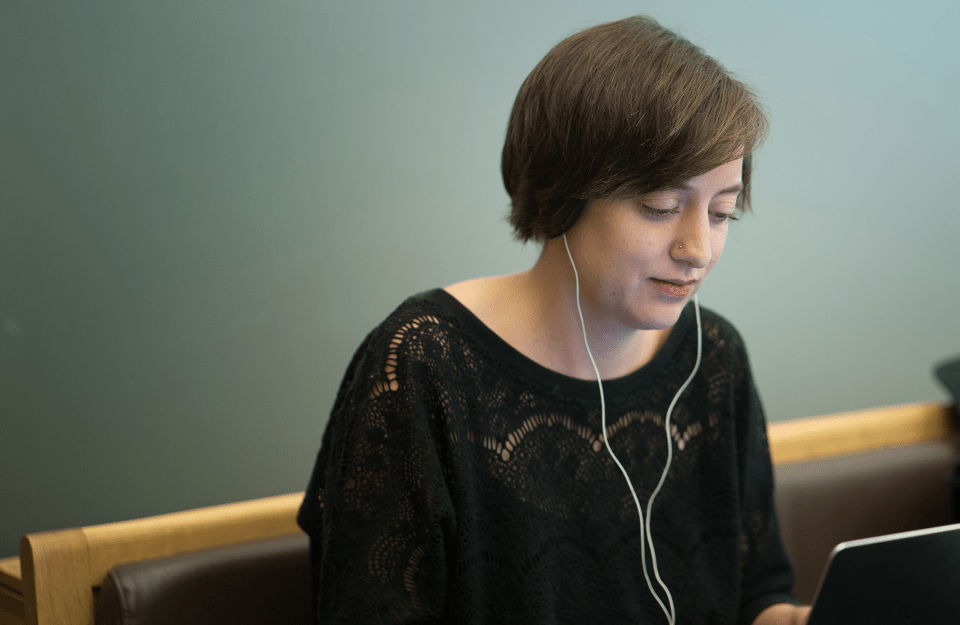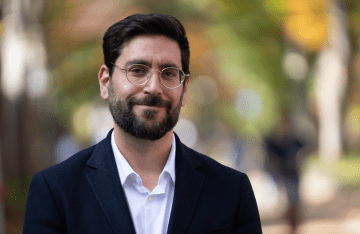Digital Culture Scholar Jessa Lingel Promoted to Associate Professor with Tenure
In this Q&A, Lingel discusses her research, teaching, and activism.

Professor Jessa Lingel was recently promoted to Associate Professor and received tenure at the Annenberg School for Communication at the University of Pennsylvania. A scholar of digital culture, Lingel’s work considers the ways that relationships to technology can show us gaps in power or possibilities for social change. On the occasion of this momentous milestone in her academic career, we asked her a few questions (via email — how digital of us!) about her five years at the Annenberg School and what her research, teaching, and activism look like now.
How has your research evolved since you joined the Annenberg faculty in 2015?
The crux of my work continues to be digital culture and looking at technology as a way to understand power relationships. Methodologically, I'm still committed to qualitative and interpretive work, although I've also started to do some projects that bring in computational analysis. I see a clear arc over the last five years, but I wonder if someone from the outside would think my research has changed more than I do!
What are some of the research projects you’re working on right now?
I have a book coming out early next year called The Gentrification of the Internet. I wanted to write a book that's useful for activists and ordinary internet users who want to understand how we got the internet we have and how we could get to something better. I have a really cool project that I've been working on for a while about nurses and union activists in Oakland, CA. It documents how badass nurses are, and also traces some of the tensions between nursing, feminism, and union organizing. I've also become obsessed with the polygraph, and I’m writing two papers about it: one on the polygraph as a technology that has been used to police queer bodies and sexuality, and a second one on how the continued power of the polygraph draws on its presence in popular culture. And finally, I'm working on a project about how professional wrestlers use Instagram to connect with their fans, which has involved a lot of collaboration with Annenberg's IT folks and computational experts. (Major shout out to Etienne Jacquot, Marlon Wenceslao, Matt O’Donnell, and Rich Cardona for their help.)
Before you were a faculty member, you were an activist librarian. What does it mean to be an activist professor, and what does that look like for you?
I've been involved in different forms of activist and organizing work for over a decade, ranging from justice for incarcerated people to voting rights to union organizing to equitable access to mental health care. Being a professor is an incredible privilege; it is humbling to remember that basically my job is to learn new ideas and share them. Plus, I basically get to set my own hours every day. Recognizing all the privilege that I have, I feel an obligation to try and use it to make inroads and connections for social justice causes. Sometimes my activist work connects clearly to Penn, like the research collaborations I've done on digital technology and mental health care for underserved populations in Philadelphia, and another project that's just getting going on local mesh networks. But a lot of times, my activist work feels pretty separate from the University, and I don't necessarily want to feel like my activist work has to show up in my research or in the classroom. I'm learning every day how to be a better ally and organizer, and I feel lucky to have the freedom that comes with being a professor, and to be in Philadelphia, where there's such a powerful history of activism.
How do you approach working with students, including teaching and mentorship?
Since I started at Penn, my goal has been to be as accessible as possible to students, which to me means being approachable. I never want students to feel too intimidated or nervous to ask for my time. In the classroom and in connecting to students, I try to make sure that I'm helping people navigate the academy as best I can, while still remembering that we all have lots of different communities and obligations that matter to us. Penn and grad school have a way of making it seem like your *only* job is to excel according to Penn's standards. But for a lot of us, it's just as important to put work into our families, communities, and art, so I try to encourage students to feel connected to that work, in addition to making school fit into their lives and dreams.
What's your favorite class that you've taught so far? Any courses that you're looking forward to teaching?
I started teaching COMM 123: Critical Theories of Popular Culture last year and I had *so* much fun. I loved introducing students to key theories in cultural studies, and giving students the tools to analyze the media that they encounter in everyday life. Next fall, I'm hoping to teach an undergrad seminar called “We Are the 99%: Media and Memory of Occupy,” which would use the 10-year anniversary of Occupy to teach about social movements and activist media. On the one hand, I'm like zomg how has it been 10 years since Occupy?? But on the other, I'm really excited to show a new generation of students and activists where the movement came from and what it achieved.



